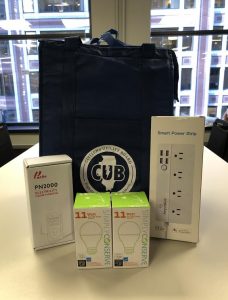
The energy efficiency kit includes two LED light bulbs, a Kill A Watt electricity-usage monitor, a smart power strip, and an insulated CUB tote bag.
Congrats to Joel of Evanston! He was randomly selected to win a free CUB energy efficiency kit out of more than 1,000 people who took CUB’s Home Heating Quiz.
Joel has won two LED light bulbs, a Kill A Watt electricity-usage monitor, a smart power strip, and an insulated CUB tote bag.
“Naturally, I’m excited,” he said. “I’m glad the quiz had good participation, and I was lucky enough to win!”
No stranger to energy efficiency practices, Joel has done away with most of the incandescent lighting in his house, opting instead for LED bulbs. He recently upgraded some of the older windows in his house and has plans to soon replace his inefficient boiler.
Joel also takes advantage of his programmable thermostat. On average, 45 percent of a home’s energy is used for heating and cooling, but according to Energy Star, properly using a programmable thermostat can save consumers about $180 every year.
“I just took the quiz just to see what I knew and to see if I could be doing more,” he said. “I’m an advocate for the rest of my family to step it up.”
To maximize his money-saving opportunities, Joel is also enrolled in Commonwealth Edison’s Hourly Pricing program. Instead of paying a flat rate per kilowatt of electricity, program participants pay a rate that varies from hour to hour based on wholesale market prices. If program participants use electricity during low-demand periods such as nights and weekends, they can potentially save.
Joel runs his dishwasher on a timer set to 2 or 3 a.m., and he does laundry on the weekends when running the washer and dryer will cost less. ComEd estimates Hourly Pricing participants like Joel have saved more than 15 percent on the electricity supply portion of their bill.
The lifelong Illinois resident said he is “definitely” saving money, and he says he will continue to depend on CUB for his energy and utility questions.
“CUB is one of only a few organizations that can give you good utility and efficiency information,” he said. “I’ll be happy to proudly carry the CUB tote bag.”
Below are the quiz questions and answers:
- Question: My gas bill measures usage in?
Answer: Therms. Your gas meter measures the volume of gas in cubic feet, but then it’s converted to therms on your bill. A therm is about 100 cubic feet. Megawatts measures electricity, and gallons is a measure of…milk (among other things).
- Question: I’m a fixed monthly charge–I NEVER go down, no matter how careful you are about saving energy (tee-hee). CUB calls me an enemy to energy efficiency, and utilities just LOVE to increase me. I am…?
Answer: The monthly customer charge. It never goes down, no matter how energy efficient you are. That’s why utilities push to increase the customer charge in rate cases before the Illinois Commerce Commission. A CUB review in September found customer charges for residential heating customers ranging from about $16 a month to more than $32 a month (for Peoples Gas).
- Question: Which of these actions is your best bet for saving energy and money and staying comfortable?
Answer: Installing attic insulation or dropping your thermostat a few degrees during the winter heating season. Beware, there are a lot of energy myths that can cost you money. Closing vents makes your heating system work harder to distribute warm air—it’s not good for efficiency. Neither is a portable heater, and it’s not always safe. And finally, beware: In this market you’re likely to lose money if you go with an alternative gas supplier.
- Question: True or false: CUB recommends that people sign up for their utility’s budget-billing plan because it will save you money?
Answer: False. CUB does recommend signing up for your utility’s budget-billing plan—but not because it will save you money. Budget billing doesn’t make your annual costs go up or down. It’s designed to even out your bills and make your out-of-pocket expenses more predictable. For example, if your bill is $150 some months, and $50 other months, under the budget-billing program you might pay $100 every month. Budget-billing plans do not change the price of your gas.
- Question: True or False: Utilities don’t make huge profits off natural gas prices?
Answer: True. Somebody’s profiting off gas prices, but not the utilities. Under law, regulated utilities pass the price of gas onto customers, with no markup. Utilities, instead, profit (too much!) off another part of your bill: the “delivery” charges—what you pay to get the gas delivered to your home.

